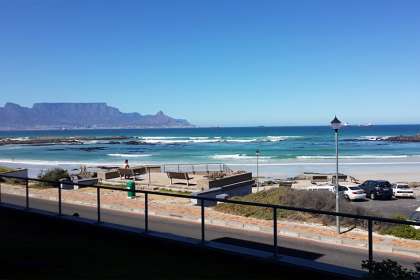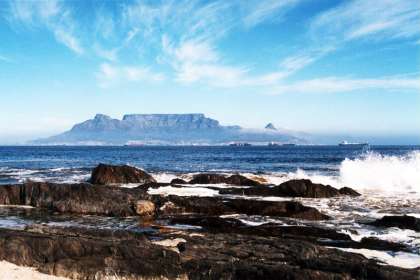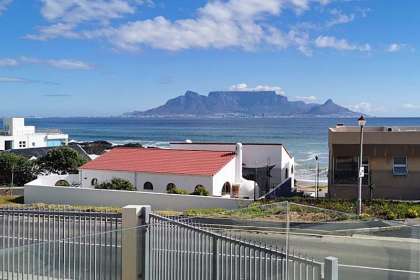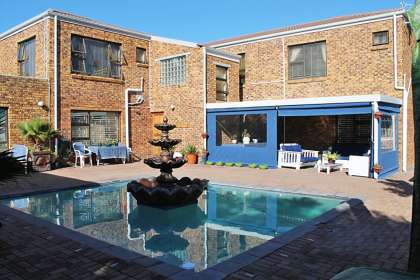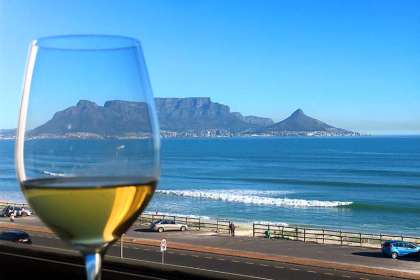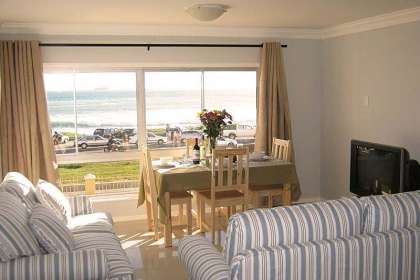Robben Island - Cape Town
- Robben Island Museum - Cape Town (0.75km)
- Freedom Swim - Robben Island to Blouberg (0.96km)
- Big Bay Beach - Bloubergstrand, Cape Town (8.39km)
- Eden on the Bay Shopping Mall - Big Bay, Cape Town (8.97km)
- Blaauwberg Nature Reserve - Cape Town (9.41km)
- Table Bay - Cape Town, Western Cape (9.66km)
- Green Point Lighthouse - Cape Town (9.95km)
- Metropolitan Golf Club - Green Point, Cape Town (10.19km)
- Green Point Park - Green Point, Cape Town (10.25km)
- Granger Bay Harbour - Cape Town (10.34km)
- Cape Town Stadium - Green Point, Cape Town (10.53km)
- Oranjezicht City Farm Market - V&A Waterfront, Cape Town (10.62km)
- Green Point Market - Cape Town (10.71km)
- Flea & Street Markets in Cape Town (10.72km)
- Cape Wheel - V&A Waterfront, Cape Town (10.81km)
- Cape Medical Museum - V&A Waterfront, Cape Town (10.91km)
- New Somerset Hospital - Green Point, Cape Town (10.95km)
- Bloubergstrand Beach - Cape Town (10.99km)
- Cape Town International Film Market & Festival (CTIFMF) (11.15km)
- Watershed - V&A Waterfront, Cape Town (11.16km)
![]() Robben Island was a leper colony from 1844 to the early 1900's. It's estimated 1,500 lepers were buried. © Graham Holtshausen, License
Robben Island was a leper colony from 1844 to the early 1900's. It's estimated 1,500 lepers were buried. © Graham Holtshausen, License![]() Robben Island Harbour © Brian Burger, License
Robben Island Harbour © Brian Burger, License
Robben Island - Cape Town
Robben Island, off the coast of Bloubergstrand in Cape Town is associated the world over with the struggles and oppression of Apartheid. Today it is a beacon of triumph telling of the victory over human rights abuse and the fight against oppression. At different times between the 17th and 20th centuries Robben Island has been used as a military training base, a prison and even a hospital. During World War 2 soldiers were trained on Robben Island and it was used as a great defence point. Between 1846- 1937 a hospital was on Robben Island for patients suffering with leprosy, mental instability and chronic illness. This was because the island created the perfect place to keep these patients isolated from the community preventing the spread and dangers of the illnesses. At the same time prisoners like Nelson Mandela were being kept on Robben Island for political and common law crimes thus making the island a prison also for the patients who had no cure.
Robben Island is Located about 12 kilometres away from Cape Town. It is 3 kilometres long and 1.5 kilometres wide and rises 35 metres above sea level. When the first settlers arrived in Table Bay they discovered an island full of birds and seals making it a good source of food. Penguin eggs where especially sought after for their size and taste and the seals were not only good for food but also their pelts. This caused both species to drastically drop in numbers. Today however the Island has been turned into a sanctuary to protect them and many tuxedo-dressed penguins now greet you on your arrival at Robben Island.
5 Interesting facts about Robben Island in Cape Town:
1. Historical Prison: Robben Island is most famous for being the prison where Nelson Mandela was incarcerated for 18 of his 27 years in prison. Other notable political prisoners, such as Walter Sisulu and Govan Mbeki, were also held here during the apartheid era.
2. UNESCO World Heritage Site: In 1999, Robben Island was declared a UNESCO World Heritage Site. It is recognized for its historical significance and as a symbol of the triumph of the human spirit over adversity and oppression.
3. Diverse History: Before its role as a prison, Robben Island served multiple purposes over the centuries, including as a leper colony, a mental institution, and a military base during World War II. Its diverse history reflects its strategic location and the evolving needs of the colonial and apartheid governments.
4. Museum and Educational Tours: Today, Robben Island is a museum and a popular tourist destination. Guided tours, often led by former political prisoners, provide visitors with a firsthand account of life on the island and the struggle for freedom and democracy in South Africa.
5. Ecological Importance: Besides its historical significance, Robben Island is also important ecologically. It is home to several bird species, including African penguins and a variety of seabirds. The island's natural environment is protected, and conservation efforts are ongoing to preserve its unique flora and fauna.
Accommodation Near Robben Island - Cape Town
Sand And See 107
Self Catering Apartment, Flatlet Accommodation in Bloubergstrand
8.9km from Robben Island - Cape TownIt is a spacious 2 bedroom flat, each room with its own en suite bathroom The main bedroom consists of a double bed and a lock-up safe is available in one of it's cupboards. The bathroom consists of a bath and an adjustable showerhead with... …see more for bookings / enquiries and info.
Blue Robin
Self Catering House, Cottage, Chalet Accommodation in Bloubergstrand
9.1km from Robben Island - Cape TownThe Blue Robin is a totally refurbished self catering seaside holiday home in Bloubergstrand. We offer a relaxed stress free environment for the business executive or tourist. Entertain associates or friends on our deck which looks out on one of... …see more for bookings / enquiries and info.
Nick's Seaside Rest
Self Catering Apartment, Flatlet Accommodation in Bloubergstrand
9.2km from Robben Island - Cape TownSituated in Bloubergstrand village, in Cape Town, a stone's throw away from one of the most beautiful beaches on the South African coast line, you will find this holiday retreat. Ideal for the discerning traveler, Nick's Seaside Rest.... …see more for bookings / enquiries and info.
Mt Bijoux Guest House
Bed & Breakfast Accommodation in Bloubergstrand
9.2km from Robben Island - Cape TownOverlooking the Atlantic Ocean and situated in Bloubergstrand on the West Coast of Cape Town, you will find the Mt Bijoux Guest House for the ultimate in hospitality, adventure & immaculate opulence... …see more for bookings / enquiries and info.
Rockpool 1208
Self Catering Apartment, Flatlet Accommodation in Bloubergstrand
9.3km from Robben Island - Cape TownSelf Catering Accommodation, Bloubergstrand, Cape Town, Western Cape, South Africa A home away from home! Our clients just keep coming back to our unique apartments! Rockpool 1208 is situated on the beach front and upon entering the apartment... …see more for bookings / enquiries and info.
Sunset 1008
Self Catering Apartment, Flatlet Accommodation in Bloubergstrand
9.3km from Robben Island - Cape TownSunset 1008 is a stylish modern self catering apartment in Bloubergstrand, Cape Town with "epic uninterrupted views" of Table Mountain from across the ocean. The apartment sleeps 4 adults and 2 children with 2 bedrooms and 2 bathrooms (one en suite). …see more for bookings / enquiries and info.
Beach Villa
Self Catering Apartment, Flatlet Accommodation in Mouille Point
10km from Robben Island - Cape TownBeach Villa apartment provides self catering accommodation in Mouille Point, Cape Town City Bowl. Beach Villa, is a spacious two bedroomed self catering apartment with stunning sea and mountain views and within walking distance to the Mouille Point beach …see more for bookings / enquiries and info.
Quest Bed and Breakfast
Bed & Breakfast Accommodation in Melkbosstrand
10.1km from Robben Island - Cape TownQuest Bed & Breakfast is situated in Melkbosstrand, a beautiful seaside village on the north-western fringe of the Cape Town Metropolis. Melkbosstrand is aptly considered the gateway to the West-Coast and is well known for its tranquillity, wide white... …see more for bookings / enquiries and info.
Sea View Zeezicht
Self Catering Apartment, Flatlet Accommodation in Bloubergstrand
10.6km from Robben Island - Cape TownThis beachfront self-catering apartment is located in Bloubergstrand on the beautiful Atlantic Coast, with stunning sea and mountain views. The beach is famous for water sports on its endless white sand, and is situated between Dolphin Beach... …see more for bookings / enquiries and info.
Aandvari Zeezicht
Self Catering Apartment, Flatlet Accommodation in Bloubergstrand
10.6km from Robben Island - Cape TownAandvari Zeezicht right on the beach offering self catering accommodation (sleeps 5) in Bloubergrant, Bloubergstrand, Cape Town. Aandvari Zeezicht - an elegant, two bedroomed apartment, in the heart of Cape Town's beautiful Blouberg. …see more for bookings / enquiries and info.
- Robben Island Museum - Cape Town (0.75km)
- Freedom Swim - Robben Island to Blouberg (0.96km)
- Big Bay Beach - Bloubergstrand, Cape Town (8.39km)
- Eden on the Bay Shopping Mall - Big Bay, Cape Town (8.97km)
- Blaauwberg Nature Reserve - Cape Town (9.41km)
- Table Bay - Cape Town, Western Cape (9.66km)
- Green Point Lighthouse - Cape Town (9.95km)
- Metropolitan Golf Club - Green Point, Cape Town (10.19km)
- Green Point Park - Green Point, Cape Town (10.25km)
- Granger Bay Harbour - Cape Town (10.34km)
- Cape Town Stadium - Green Point, Cape Town (10.53km)
- Oranjezicht City Farm Market - V&A Waterfront, Cape Town (10.62km)
- Green Point Market - Cape Town (10.71km)
- Flea & Street Markets in Cape Town (10.72km)
- Cape Wheel - V&A Waterfront, Cape Town (10.81km)
- Cape Medical Museum - V&A Waterfront, Cape Town (10.91km)
- New Somerset Hospital - Green Point, Cape Town (10.95km)
- Bloubergstrand Beach - Cape Town (10.99km)
- Cape Town International Film Market & Festival (CTIFMF) (11.15km)
- Watershed - V&A Waterfront, Cape Town (11.16km)




